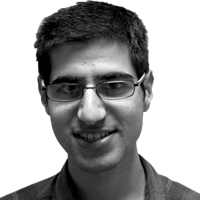
While the entire world watches for war between Israel and Iran, I sat down last Friday night for an interfaith dialogue Shabbat dinner organized by Hillel and the Muslim Student Association.
I didn’t quite know what to expect, but as clichéd as it sounds, I came away from the dinner of dialogue with new knowledge, appreciation and, perhaps most importantly, friendships.
Let me give you some context. I’m accustomed to celebrating Shabbat in fairly homogeneous environments. To be frank, one of the things that continually draws me to the weekly dinners is their consistency. No matter how hectic my week may be, every Friday night I know I can rely on a standardized service and conversations with people with more or less similar perspectives and faith backgrounds.
In college, Shabbat dinner is a perennial point of stability which my dynamic and unpredictable weeks continually orbit. I felt ambivalent about disrupting my routine. Also, my more cynical self wanted to know: What exactly do I have to learn from people so radically different? What place does Islam have in my weekly Shabbat dinner?
Cut to 10 p.m. Friday night. The formal meal has been over for nearly half an hour. Yet, surrounded by delicious chocolate brownies and shared laughter with my new friends Abeer and Farhan, I’m wondering why I would ever leave.
The conversation takes on a less lighthearted tone. “What does that mean for you?” Abeer asks, pointing to my kippah (yarmulke). Not giving it too much thought, I respond at first with the distant, historical, scholarly understandings: all valid ideas, but ones only felt on a dry level of abstraction.
“And your Hijab?” I wonder, referring to the traditional Muslim woman’s head-covering. Abeer pauses. She goes on to comment much more articulately. She remarks on the social implications of wearing such an ideologically packed piece of clothing; the spiritual effect of announcing your faith to every person who sees you, before you open your mouth; the inherent beauty in a form of service of quiet modesty.
In her reflections I recognize my own thoughts, only developed more fully. I am struck all the more by their impact on me, coming from her mouth, the voice of someone whom I would have otherwise previously instinctively characterized as the distinct “other.”
More broadly, I suspect many people problematically form conclusions about Islam from what they see in the headlines. Iran wants to nuke Israel. Islamofascism is taking over the world. Terrorism. Sept. 11, 2001. The world is frightening and, terribly, Islam often seems to be one of the things that make it so.
Yet amidst the globalized frenzy, there was something majestically simple and unadulterated about the interfaith Shabbat dinner. I think everyone who was there tacitly agreed to leave the fear-mongering of impending nuclear disaster out of the room.
By no means am I advocating ignoring very serious and pressing issues, but what I sensed on Friday night, and what I think was accomplished, was a very personal and real thing. The surface-level qualities of the dinner, the food and decorations, even the accomplished guest speakers were all nice. But I think they only served to provide the context for the more meaningful personal connections.
I saw Jewish students chatting with Muslim students, just hanging out, in a casual and friendly warm environment like I’ve never seen here or anywhere else. The event was a success because the conversations were relaxed and authentic.
If you haven’t drowned in the corniness just yet, I would dare say that the evening of learning about Islam and breaking boundaries was one of my most memorable nights of college so far.
“Would you have ever thought that we would share such an experience?” I ask Abeer, even though it was obvious that I didn’t.
“I don’t see why not. It’s really quite simple, after all.”


